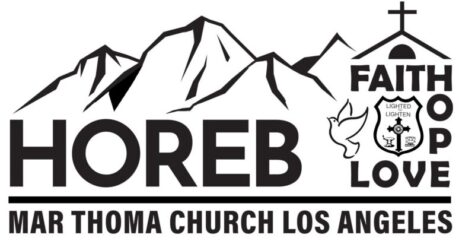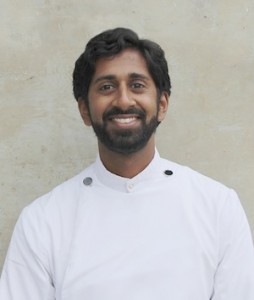Homeless Shelter Outreach – Buena Park, CA
The Horeb Mar Thoma Church (Edavaka) Mission is conducted an outreach to the Buena Park Homeless shelter on Saturday, April 12 at 5:00 pm. We got an opportunity to pray, sing worship hymns and a share the word of God with the inhabitants of the homeless shelter. Of course, we had food to share with everyone.. Thanks to all who could make it.
2014 Sevika Sangham Western Conference
The 13th Annual Western Regional Sevika Sangham Conference was held at the Horeb Mar Thoma Church on Sat, March 15. As the psalmist says in Psalm 118 vs 23 “It is the Lord’s doing and it is marvelous in our eyes”. Thank you for all our sister church for your prayers and participation. A special thanks to each and every one of our members for the commitment and time as a part of planning for the conference.
World Day of Prayer
The World Day of Prayer was held on March 7th at the Horeb Mar Thoma Church. The theme for this year was “Streams in the Desert” dedicated to the women in Egypt with special prayers for them. The special service was prepared with the World Day of Prayer Committee in Egypt and was conducted all over the world.
Let The Nations Be Glad
Unapproachable, inaccessible in location or situation, untouched, untouchable, disconnected, unable to be met or out of touch. These are all words and descriptions given for yet another word: Unreached.
Veil of Tears: Persecution of Indian Women
Persecution of Indian Women: Documentary Exposes Abortion, Sex Trafficking, Rape
Morgan Lee
India suffers from an abysmal literacy rate, weak infrastructure and rampant poverty. But one of the toughest challenges the world’s second largest country must confront in the 21st century is how it will better serve its declining and vulnerable female population.
As a whole, Indian men surpass women 1,000 to 943. According to a CNN story from 2013, there are regions where the figure falls below 800.
The causes discouraging families and communities from raising and protecting girls and women are explored in “Veil of Tears,” a new documentary from Gospel for Asia, which releases in the U.S. on March 28.
A woman in India faces obstacles from the moment she is conceived. Families who see girls as an economic cost, rather than benefit, may abort female babies or leave infants to die after birth. Once out of the womb, women may be sold by their families or kidnapped into the sex trafficking industry.
In an op-ed on Monday Christian singer Natalie Grant, who narrates the film, wrote that the documentary reminded her that in light of Women’s History Month and International Women’s Day, many who shared her gender did not share her access or opportunities.
“This violence and injustice, whether it’s dowry related or associated with human trafficking or takes the form of infanticide, is a daily reminder that deeply-rooted traditions still enslave millions of women across the globe. It’s a constant reminder to victims that things will never change — things will never get better,” wrote Grant.
Many rural women may also find themselves subject to bride burning, where a groom may kill his wife because of unhappiness with his dowry, and widow abandonment.
But urban women are not necessarily safer than their rural counterparts. Many cities are hubs for sex trafficking and illicit sex work. A 2012 gang rape in Delhi which led to the death of a 23-year-old medical student, suggested that even women in the country who do have the chance to pursue a more Western styled lifestyle remain at risk.
“Our goal with ‘Veil of Tears’ is to portray the realistic picture of millions of women in South Asia who have been oppressed, just because of their gender,” said Dr. K. P. Yohannan, founder and international director of Gospel for Asia. “We hope that the body of Christ — and even those who are not Christians — will see that as human beings, we have a moral obligation to care and think and to act, to bring some hope for these women.”
Kenny Saylors, who directed and produced the documentary with his brother Kyle, said that in the film, he tried not only to capture the oppression to which India women are subject, but also show where their trajectory may be turning more positive.
“For nearly 20 years, we have made films that capture the tragic side of the human experience,” said Saylors. “But we also try to communicate the beauty and hope found amid tragedy. In ‘Veil of Tears,’ we wanted to show the courage, resilience and faith of women and demonstrate that God is changing hearts and lives, even in the most difficult of situations and locales.”
Grant wrote that she hopes the film will also encourage Western women to do more to help Indian counterparts.
“We need to remain vigilant to the plight of those who still face severe mistreatment because of their gender,” she wrote. “While my heart still aches from the brutal oppression I saw among so many women, that ache turns to joy when I see them embracing the hope that some concerned people are working to offer them: educational opportunities, literacy training and job skills … You can help by getting educated, supporting organizations working to end the oppression of women and speaking out against this persecution.”
Veil of Tears: Life Cycle of Abuse Doesn’t Have to be the Norm
Natalie Grant, Singer/Songwriter
This past Saturday, March 8th, was International Women’s Day. As the West celebrates the progress women have made, let’s remember that in certain parts of the world it is still better—and safer—to be born a man.
I live with an image that has wrecked me for life. While touring a brothel in Mumbai, India, on a fact-finding mission related to human trafficking, I witnessed something terribly disturbing. I must share it because for things to change for millions of women throughout South Asia, others must know and also speak out against the oppression they face.
The rope wasn’t long, but it securely tethered the 18-month-old girl to her mother’s bed. The baby wasn’t tied there because her mother was extremely ill and didn’t have other options for keeping her daughter safe. No, since the mother used the bed as her workplace—being a victim of human sex trafficking—it was the only way for her to keep an eye on her daughter while she worked.
Each year, hundreds of thousands of women are sold into the sex trade throughout Asia, where many remain trapped until they die—most likely from AIDS.
Astonishingly, this is just the tip of the iceberg when it comes to the oppression many women face in South Asia. In addition to human trafficking, women and girls are subject to gender-based abortions, infanticide, dowry-related homicides, including bride burning, widow abandonment and a host of other injustices committed against them simply because of their gender.
This life cycle of abuse against women must be stopped.
In some countries if you are fortunate enough not to be aborted because you are a girl, your gender will still haunt you. When you get married, your parents will likely be expected to pay dowry.
Even though dowry is outlawed in many parts of South Asia, it is still practiced. If a dowry is not paid or is not paid sufficiently, women face the prospect of being killed by their new family members. In India, for example, there are more than 7,000 cases of bride burning each year, and tens of thousands of other cases go unreported annually. In other instances, the bride’s family has to take out loans in order to cover the costs of dowry, sometimes requesting an amount equal to numerous years of family income.
Women are also blamed when the husband dies, no matter the reason for his death. The widow is viewed as cursed and is often shunned, hated and even cast out into the streets. Once put out, their options are limited. They might turn to begging, prostitution or sadly, suicide.
This violence and injustice, whether it’s dowry related or associated with human trafficking or takes the form of infanticide, is a daily reminder that deeply-rooted traditions still enslave millions of women across the globe. It’s a constant reminder to victims that things will never change—things will never get better.
This life cycle of abuse is showcased in the new movie “Veil of Tears,” which I had the privilege of narrating. The film not only documents the daily struggle many women face in this part of the world, but it also highlights the wonderful stories of hope emerging from the ashes.
March is Women’s History Month, where we celebrate the incredible progress of women around the world. We need to remain vigilant to the plight of those who still face severe mistreatment because of their gender.
While my heart still aches from the brutal oppression I saw among so many women, that ache turns to joy when I see them embracing the hope that some concerned people are working to offer them: educational opportunities, literacy training and job skills. These are just a sample of the practical resources that are changing destitute lives into fruitful and positive futures.
But more is needed. You can help by getting educated, supporting organizations working to end the oppression of women and speaking out against this persecution.
My hope is that the 18-month-old girl who was tethered to her mother’s bed will have the opportunity to grow up in a world drastically different from the one her mother experienced. This new world will see her as a valuable and unique individual. Her gender will play no role in how she is treated, and her future will not be limited because of who she is.
Natalie Grant is a singer-songwriter of contemporary Christian music. She received the Gospel Music Association’s Dove Award for Female Vocalist of the Year four consecutive years, and again in 2012.
The man who invented the Jump Shot in basketball
Kenny Sailors is credited with inventing “the jump shot” in basketball. Till then it was a two-handed shot. He won an NCAA championship, and he played in the NBA. He was married to his sweetheart for sixty years. And yet there is one thing that has been the most satisfying thing to him in all his life.
See the video and find out.
Something More
One man’s life changed the course of history for billions of people across the globe. He is both revered and reviled, famed and feared and you know who he is without a single mention of his name.
;
Devotions for Lent
For those who are observing lent and even for those who are not, I think these devotions for lent would be very useful.
It’s from the Lutheran Seminary. Along with the Catholic church, the Anglican, Methodist and Lutheran church observes lent from Ash Wednesday.
https://www.horebmtc.org/hp_wordpress/wp-content/uploads/2014/03/Lent-Devotions.pdf
Mar Thoma Church observes Great Fifty days lent. Here’s an article from our Theodosius Thirumeni on the Great Lent.
Great Lent or Valiya Noyambu
Feasts and fasts are the part of the tradition of all religious communites. In the Christian Churches of Antiochian tradition, including Mar Thoma Church, the Great Lent consists of 40 days ending with 40th Friday, with an extension of 10 more days inclusive of Palm Sunday, Maundy Thursday, Good Friday and Easter. It spreads to 7 weeks with a total of 50 days.
Lent is a season observed by our church as a time set apart for fasting and prayer and also a time of introspection. Observing silence is a great help during these days to have transcendence of mind. In the life of the community of the faithful, lent provides a time for spiritual discipline regularly. It is the practice of a life of denial, taking up the cross and following Jesus Christ. Here we recognize that permissiveness is not the principle of life. Freedom in life is a restricted and responsible freedom. Lent is based on the spiritual practice of fasting and prayer-both in the Old Testament and in the New Testament. Jesus began His public ministry with forty days of fasting and communion with God (Matt. 4:2, Mk 1:13, Lk 4:2). Here the mind is not kept idle but will be very active in communion with God. Fasting and prayer remain as an undeniable character of the Church from the early days (Acts 13:2, 14:23). We wait upon the Lord in fellowship for renewal and strength.
The great lent or Valiya Noyambu is specifically set apart as a time of fast, prayer and meditation wherein we remember the person and work of Jesus Christ and ultimately connect ourselves to His passion and death on the cross. Christ redeemed the whole humanity from sin and death. Lent is in fact a spiritual retreat of the Church, through which the members of the church meditate upon the cross of Christ and submit to it in a sense of complete repentance. These fifty days should help every member of the church to have an experience of abiding in Christ in a realistic way (Jn15).
Fasting should never be observed with ostentation or spiritual pride Matt 6:16-18). Fasting is a spiritual discipline where we try to have mastery over the very things, which we understand as difficult to change. Jesus is the Lord of life and no interest in life shall stand on the way of experiencing His Lordship. So if you discover that you are a slave to certain habit, or you have a liking for any pleasure of taste, lent is a season to give it up and have mastery over it. Lent is not intended to win favors from God; instead it is the fulfillment of the will and purpose of God. It is not a ritual in which we try to change God’s mind rather we transform ourselves to have the mind of Christ. We discipline our life to care the needy and to show mercy to those who deserve it. It reminds us of the transformed practices of Zacheus who found salvation in Christ.
The exercise of Lent is also a time of rebuilding the altars of prayer – both personal and collective, studying the Word of God and developing a strict discipline of giving and forgiving. This helps the believer to gain internal strength to resist temptations, carnal desires and vested interests. Fasting is a time of reconciliation and healing (2Cor 5:11-21). It is a time to reconcile with the whole of creation and to heal the wounds of the world to make it a habitable one. It is a time of transcendence and transformation. St. Paul says in Rom. 1: 1&2 “Therefore I urge you my brethren, in view of God’s mercy, to offer your bodies as living sacrifices, holy and pleasing to God – this is the spiritual act of worship. Do not conform any longer to the patterns of the world, but be transformed by the renewing of your mind. Then you will be able to test and approve what God’s will is – his good, pleasing and perfect will”.
Believers are encouraged to read and meditate on the word of God during lent. It will be useful to use continuously a devotional book. Those who study the Bible and use the devotional guide are to spend time in prayer asking God the Holy Spirit to guide you to understand the spirit and meaning of what is the given text for each day. This is not merely an intellectual exercise but a time of devotion, where you accept the Biblical truth into your life, so that it will bear fruit of renewal and transformation.
When you celebrate Easter, let this spiritual exercise help you to celebrate your spiritual life in abundance and to live victoriously in the power of the Holy Spirit. The celebration of the resurrection of Jesus leads the believer towards a renewed life and the faith community to a life of witnessing the power of Christ’s resurrection and to live with great hope towards consummation in the Kingdom of God.
Mar Theodosius







